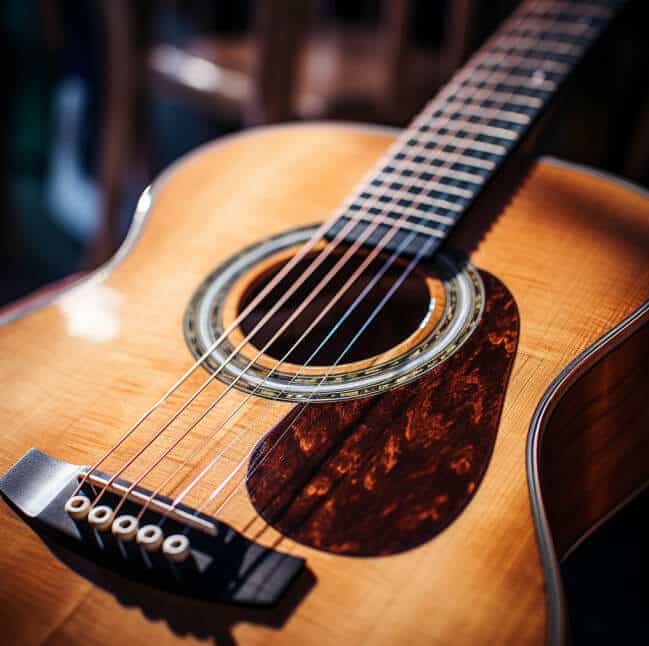Table of Contents
Ah, guitar strings! Those magical threads that breathe life into our beloved six-stringed companions. But here’s the million-dollar question: Are guitar strings universal? Can we assume they are created equal?
Can you just waltz into any music store, grab a pack off the shelf, and expect it to be a match made in musical heaven for your guitar?
Well, hold onto your picks, folks, because in this Killer Rig article, we’re about to dive deep into this stringy conundrum and unravel the truth. Spoiler alert: It’s not as straightforward as you might think!
Quick Answer
Guitar strings are universal in the sense that they will work on almost any guitar. You can put them on and tune them up, and in most cases, they will produce sound. But this doesn’t mean they will perform well.
For example, strings made for an acoustic guitar will not provide the output needed for an electric. This is because the material they are made from won’t work well with the pickups.
You also have to be careful with steel strings on a classical guitar. The classical is not made to handle the tension steel strings require to tune up. This could damage the guitar. So are they universal? Well, some are and others are not!
Are Guitar Strings Universal?
When we talk about something being “universal,” we’re essentially saying it’s a one-size-fits-all solution, right? In the world of socks or coffee cup lids, that might be the case. But when it comes to guitar strings, the waters get a tad murkier.
First off, let’s get our heads around what universal might mean in the context of guitar strings. Are we saying that a single set of strings can fit any guitar, from a jumbo acoustic to a sleek electric? Or are we suggesting that they’d produce the same sound quality across different guitars?
Guitars, much like us humans, have their own personalities, quirks, and strengths. An electric guitar, with its magnetic pickups, has different string requirements compared to an acoustic, which relies on the resonance of its body to produce sound. And don’t even get me started on classical guitars with their nylon strings!
So, while the idea of a universal guitar string is enticing (imagine the convenience!), it’s essential to understand the nuances and differences that make each guitar unique. Only then can we truly appreciate why there isn’t a one-string-fits-all solution out there.
Factors that Determine String Compatibility
Guitar strings might seem like simple, straightforward things, but oh boy, there are factors playing behind the scenes that determine their compatibility. Let’s pluck out the keynotes.
Guitar Type
Every guitar has its own voice, and a lot of that comes down to its type. Whether it’s the deep, resonant tones of an acoustic, the electrifying vibes of an electric, or the soulful melodies of a classical, each requires a specific set of strings.
Slapping electric guitar strings on a classical? That’s like trying to fit a square peg in a round hole! You will not appreciate the end result, trust me!

Tuning Mechanisms
The design of the tuning pegs used can influence string choice. For instance, some guitars have slotted headstocks, which are commonly found on classical models and require a specific type of string end.
On the other hand, solid headstocks with side-mounted tuners, often found on acoustics and electrics, have different requirements. The mechanism’s design can also affect how easily a string can be tuned and how well it maintains its pitch.
Bridge Design
Ever noticed the different ways strings attach at the base of the guitar? Some have pins, some loop around, and others tie on. This bridge design isn’t just for looks; it dictates the type of string ends you need.
Using the wrong type can range from being a minor inconvenience to causing actual damage.
Every component, no matter how small, plays its part. And while the strings might be the lead vocalist, they need the right backup to truly shine.
Check out my article on guitar string types.
The Myth of One-Size-Fits-All
Ah, the allure of simplicity! In a world where convenience is king, the idea of a universal string that fits every guitar sounds like a dream come true. But, as with many things in life, it’s not quite that simple.
1. The Voice of Each Guitar
Just as every singer has a voice all their own, every guitar has its own sonic signature. This is shaped by its construction, materials, and, yes, its strings. Using the wrong strings can be like putting opera vocals in a punk rock song – it just doesn’t gel.
2. The Danger of Mismatch
Using the wrong strings isn’t just a matter of sound. It can lead to physical issues for the guitar. Too much tension can strain the neck, while too little can cause fret buzz. And in the worst-case scenario? A snapped string that could’ve been avoided.
3. The Evolution of Guitar Design
Guitars have evolved over centuries, with different designs emerging to suit various musical styles and preferences. From the deep-bodied dreadnoughts to the slim electric guitars, each design has specific needs.
Expecting one string type to suit them all is a bit like expecting one type of shoe to fit everyone, from toddlers to basketball players.
Check out my article on guitar string gauge here.
Specialty Strings and Their Needs
Guitar strings aren’t just limited to the standard sets you see in most music stores. There’s a whole world of specialty strings designed for certain instruments and specific purposes. Let’s lay it all out in a table for clarity:
| Specialty String | Description | Typical Use |
|---|---|---|
| 12-String Guitar Sets | These sets contain double the usual number of strings, with one standard and one octave higher string paired together. | Used on 12-string guitars to produce a richer, chorus-like sound. |
| Baritone Sets | Thicker and longer than standard strings, they produce deeper tones. | For baritone guitars, which are tuned lower than standard guitars. |
| Charango Strings | Typically made of nylon or gut, these are for the 10-stringed charango. | Used in traditional Andean music. |
| Oud Strings | Made of nylon or gut, these are for the 11 or 13-stringed oud. | Central to Middle Eastern music. |
| Extended Range Sets | Designed for guitars with more than the standard six strings, like 7-string or 8-string guitars. | Popular in genres like metal and jazz. |
| Silk and Steel | A combination of steel and silk, these strings are softer and produce a mellower sound. | Often preferred for fingerstyle playing. |
These specialty options highlight the vast diversity in the world of guitars and their strings. Each set is tailored for a specific instrument or sound, underscoring the idea that there’s no true “universal” string.
Conclusion
Guitar strings play a pivotal role, weaving together melodies and harmonies that resonate with our very souls. But as we’ve seen, the world of strings is as diverse and intricate as the music they help create.
The idea of a “universal” guitar string, while enticing, is a bit of a pipe dream. Each guitar, from the humble acoustic to the roaring electric, has its own voice and specific needs. And that’s not even diving into the realm of specialty strings, each tailored for a specific purpose.
So, the next time you’re on the hunt for a new set of strings, take a moment to appreciate the vast choices before you.
FAQs
Can I use electric guitar strings on an acoustic and vice versa?
While it’s technically possible, it’s not recommended. Electric guitar strings are designed for magnetic pickups. While acoustic strings are made to resonate within the guitar’s body. Using the wrong type can affect sound quality and even damage your guitar.
Why do some strings have ball ends and others don’t?
Ball ends are common in steel-string acoustic and electric guitars. They make string changing quicker and ensure a secure fit in the bridge. Classical guitars, on the other hand, typically use tie-end strings due to their bridge design.
Are there any truly universal strings available on the market?
While some strings are marketed as “universal,” it’s essential to understand that no single string set will be perfect for every guitar type. It’s always best to choose strings based on your guitar’s specific needs and your playing style.
Can I mix and match strings from different sets?
While it’s possible, it’s essential to ensure that the strings you’re mixing have compatible tensions and materials. Mixing strings haphazardly can lead to uneven sound and playability issues.

